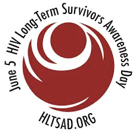By Moisés Agosto-Rosario, NMAC Director of Treatment
 NMAC celebrates and honors HIV Long-Term HIV Long Term Survivors (HLTS) by raising awareness of their needs, issues, and journeys. For those who lived through the early days of the HIV epidemic, AIDS at 40 years is the future we never imagined. Our lives were full of uncertainties and fear. We were afraid of the possibility of being the next one to get sick and die. We took care of our friends and served our community fearlessly. We created HIV services by responding to our HIV+ brothers and sisters’ needs; we organized and mobilized by forming coalitions like the People with AIDS Coalition (PWAC), Body Positive (BP), and the AIDS Coalition to Unleash the Power (ACT UP). We created national organizations in Washington DC to advocate with us. Organizations like the National Association of People with AIDS (NAPWA), the National Minority AIDS Council (NMAC), the American Foundation For AIDS Research (AmfAR), and the AIDS Action Council and Foundation (today known as AIDS United) developed an HIV policy plan. They lobbied Congress and the federal government for funding and better provision of services.
NMAC celebrates and honors HIV Long-Term HIV Long Term Survivors (HLTS) by raising awareness of their needs, issues, and journeys. For those who lived through the early days of the HIV epidemic, AIDS at 40 years is the future we never imagined. Our lives were full of uncertainties and fear. We were afraid of the possibility of being the next one to get sick and die. We took care of our friends and served our community fearlessly. We created HIV services by responding to our HIV+ brothers and sisters’ needs; we organized and mobilized by forming coalitions like the People with AIDS Coalition (PWAC), Body Positive (BP), and the AIDS Coalition to Unleash the Power (ACT UP). We created national organizations in Washington DC to advocate with us. Organizations like the National Association of People with AIDS (NAPWA), the National Minority AIDS Council (NMAC), the American Foundation For AIDS Research (AmfAR), and the AIDS Action Council and Foundation (today known as AIDS United) developed an HIV policy plan. They lobbied Congress and the federal government for funding and better provision of services.
We shook government institutions through direct action, demonstrating against the government silence and inaction, pushing them to do the right thing. We became scientists and, with knowledge, demanded drugs into bodies and had a tangible impact on the development of HIV medicines. We created principles to empower ourselves and assert our right to “be involved at every level of decision-making and specifically serve on the boards of directors of provider organizations” and “not to be labeled as “victims,” a term which implies defeat.” I can go on and list the challenges and successes of the HIV community through the past 40 years with long-term survivors front and center. We are the reason we have treatment that has impacted our lifespan, allowing us to live longer and healthy lives. Long-term survivors should always be the foundation and the guiding principle for anyone in the HIV movement advocating or providing services.
Those of us aging with HIV and over 50 (HIV50+) are now the community’s elders. The HIV professional field and political movement were created by us and for us. Sadly, today it seems that we have been forgotten, and many of the elder HIV long-term survivors that once were warriors today are alone and in isolation. Our first HIV warriors are the long-term survivors we honor today and the first group of HIV+ people aging and over the age of 50. HLTS need science and research to understand the biology and medical treatment of aging with HIV, and health care that addresses multi-morbidities and develops standards of care and provision of services appropriate for this aging community. Today is a day to honor and reflect on what has been and will continue to be the role and contribution of the HIV 50+/HLTS. It is a day to renew our commitment to people living with HIV/AIDS (PLWHA), learn and implement the Denver Principles; it is a day to recognize and facilitate and empower PLWHA to be at the decision-making tables, as it should be. Long-term survivors are the guiding principle and light to illuminate the path and the action we take to end the HIV epidemic.
